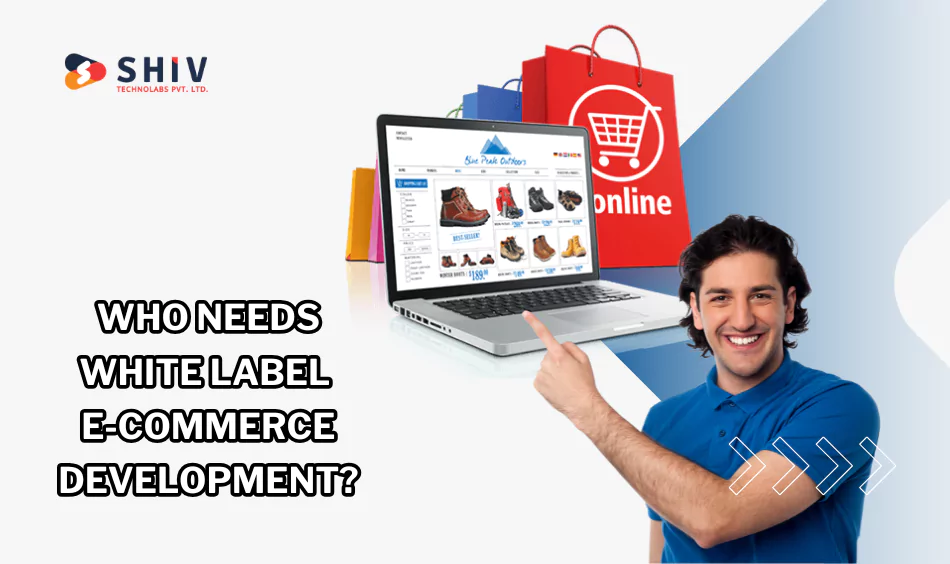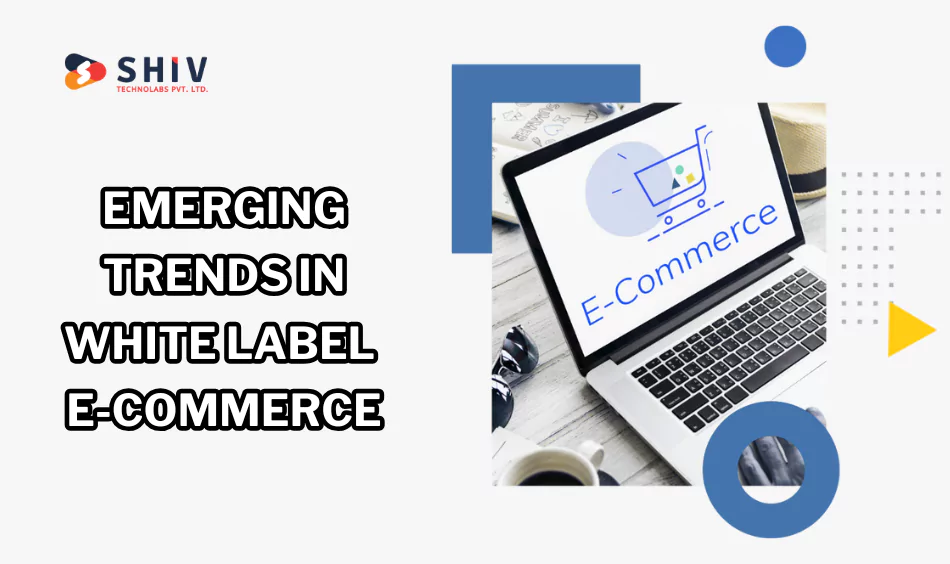Table of Contents
Demand for quick, branded online stores is rising across industries as buyers expect polished digital shopping. Businesses now choose white label development solutions to offer ready-made stores under their own brand identity.
With white label e-commerce solutions, providers deliver fully functional stores that launch fast and look truly branded. You focus on clients, pricing, and marketing while the build, integrations, and testing remain handled by specialists. It fits agencies, resellers, and founders who want results quickly, with clear ownership and predictable delivery.
What Is White Label E-Commerce Development and How Does It Work?
White label e-commerce development means a specialist team builds the store, and you apply your brand. You resell that store as your product, complete with your logo, colors, domain, and documentation. Clients see a consistent identity, while the technical work stays with the original production partner team.
Through white label e-commerce platform development, providers handle integrations, performance, payments, catalogs, and security hardening. Your team focuses on sales, onboarding, content, and service levels while the platform stays stable behind the scenes. This split speeds delivery and reduces risk because proven build patterns replace one-off custom development.
Step-by-Step Process
- Requirement gathering
Define the audience, catalog size, key features, and compliance needs to guide scoping and timelines. - Selecting design and layout
Pick a template or custom layout that fits the brand voice, product range, and conversion goals. - Store development and setup
Configure products, payments, taxes, shipping, and apps while preparing category structures and search. - Branding with the client’s details
Apply logo, palette, typography, domain, and policies so every touchpoint reflects the client’s identity. - Testing & delivery
Validate speed, checkout flows, and device compatibility, then hand over credentials and go-live playbook.
Who Can Benefit from White Label E-Commerce Website Development?

Teams across many sectors gain from white label e-commerce website development when speed and brand control matter most. Agencies package proven storefronts as their own, grow revenue faster, and reduce delivery risk for clients. Suppliers, founders, and platforms launch quickly while keeping a consistent identity across catalogs, campaigns, and support touchpoints.
- IT and software service providers expanding their offerings
- Product suppliers entering online sales
- SaaS companies adding store features
- Entrepreneurs targeting niche markets
- Wholesale and B2B sellers
These groups share similar goals: quick delivery, strong branding, predictable running costs, and low setup risk. A white label model helps teams avoid hiring sprees while shipping consistent storefronts for many clients. It also supports repeat sales through templates, playbooks, and support plans that shorten onboarding for every new project.
Why Choose Ready-to-Sell Online Store Solutions?
Ready-to-sell online store solutions help teams launch fast without managing code, servers, or difficult integrations. The store arrives configured with products, payments, tax rules, shipping methods, and brand assets already prepared. You start selling quickly, maintain your margins, and keep clients happy with a professional buying experience.
The model cuts initial investment and shortens timelines because major components are ready on day one. You avoid recruiting engineers, yet still deliver clean storefronts, scalable catalogs, and supported payment gateways. Post-launch assistance covers updates, fixes, and guidance so teams can focus on marketing and growth.
Key Benefits:
- Low initial cost compared with ground-up builds
- Faster delivery and predictable launch windows
- No deep technical expertise required to operate
- Ongoing support for updates and troubleshooting
Comparison Table:
| Feature | Ready-to-Sell Stores | Custom Development |
|---|---|---|
| Initial Cost | Lower | Higher |
| Technical Expertise Needed | None | High |
| Maintenance | Managed by Provider | Managed by Client |
How to Select the Best White Label E-Commerce Solutions Provider?
Picking a partner for white label e-commerce solutions calls for clear criteria and verifiable delivery history. You want reliable builds, predictable timelines, and accountable support contacts from discovery through post-launch phases and handoffs. Ask for references, sample storefronts, and uptime data to confirm the provider meets your standards.
Checklist:
- Proven track record in branded e-commerce store development across multiple verticals and order volumes
- Transparent pricing and contracts with clear inclusions, exclusions, and change-request rules
- Scalable and customizable features covering catalogs, checkout, apps, and international needs
- Strong security compliance for payments, data access, logging, and audit readiness
- Reliable post-launch support with SLAs, escalation paths, and documented response targets
Compare service-level terms, handover scope, and non-compete rules to protect long-term client relationships and margins. Confirm who owns theme code, content, and third-party licenses before you sign, and document handback requirements. Request a migration plan for future upgrades, so stores can grow without costly rebuilds or long downtime.
Benefits of Branded E-Commerce Store Development
Branded e-commerce store development builds trust, signals stability, and sets expectations from the first visit. Consistent design, policies, and messaging reassure buyers, reduce friction, and lift repeat purchases over time across devices. Clear ownership also supports premium pricing, stronger referrals, and multi-channel campaigns that keep customers engaged across seasons.
Our team delivers ready stores, custom themes, and growth support under strict service-level agreements and warranties. We include template libraries, payment setups, analytics dashboards, and performance audits before launch on key user flows. You receive branded documentation, training sessions, and clear handover packs that make operating the store simple.
Future Trends in White Label E-Commerce Platform Development
Intelligence and Payments: What’s Next for White Label Platforms
White label e-commerce platform development is shifting toward smarter, faster, and modular builds across industries today. Teams want predictable delivery, lighter maintenance, and growth tools that support everyday operators without heavy overhead. Vendors answer with upgrades improving personalization, payments, integrations, and operations while avoiding long, risky rebuilds.
AI merchandising adapts homepages, sorting, and cross-sells to current behavior, increasing discovery and average order values. Payment stacks add local wallets, subscriptions, and split settlements, while gateways cut false declines during peak traffic. Privacy improves through stronger consent tools, first-party data hubs, and clear deletion workflows for audit readiness.
Modularity, Global Scale, and Operations: The Road Ahead
Low-code editors speed changes with block libraries, preset sections, and reusable components for recurring promotions. Teams switch layouts, launch bundles, and refresh content quickly without requesting developer time for routine tasks. Staging workflows and theme variations safeguard experiments while protecting live traffic and critical revenue targets.
Composable storefronts link specialized services through APIs, letting merchants assemble best-in-class stacks by function with confidence and control. Cross-border selling grows with translations, currency switching, duties calculators, and local carriers across priority markets. Operations add returns centers, warranty flows, and subscription pauses, while automations sync inventory and trigger timely updates.
Conclusion
Ready-to-sell stores help you launch faster, protect brand consistency, and grow revenue without building costly teams. You gain predictable delivery, reliable support, and a store ready for campaigns, subscriptions, and international orders. Your team focuses on sales and service, while proven build patterns reduce launch risk across peak periods.
Shiv Technolabs delivers branded stores, training, and post-launch care aligned with your budget, timeline, and growth goals. Our white label services include clear scopes, SLAs, and onboarding so you can move from brief to launch quickly. Tell us your launch window, and we will share a precise plan, milestones, and next steps today.
























